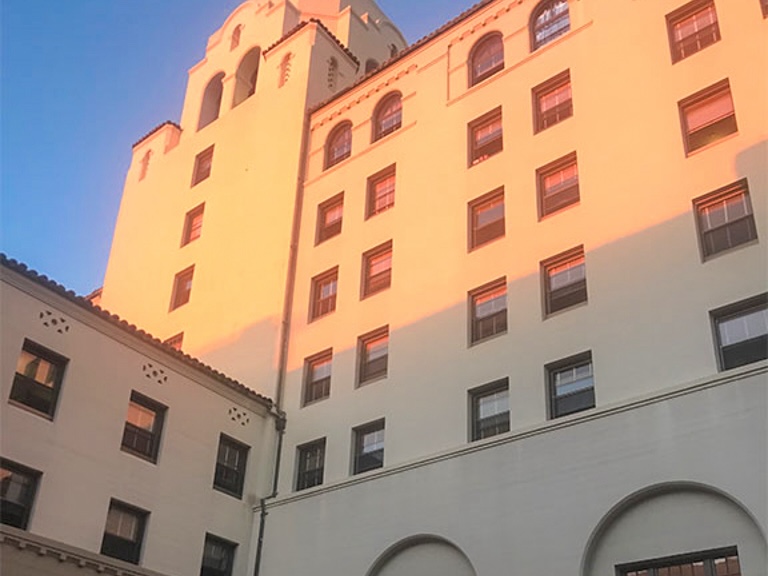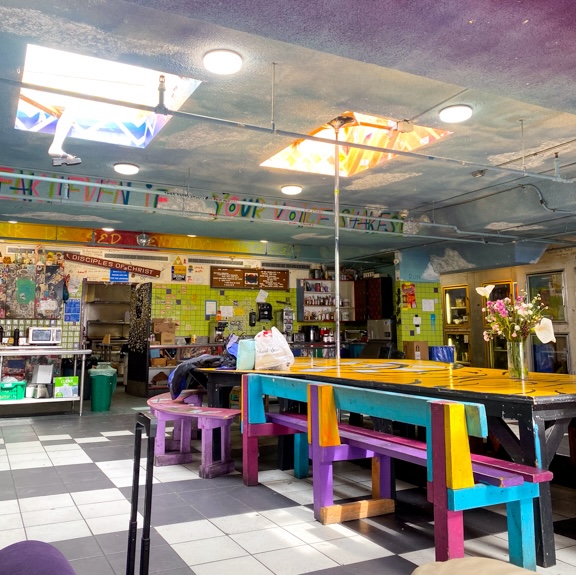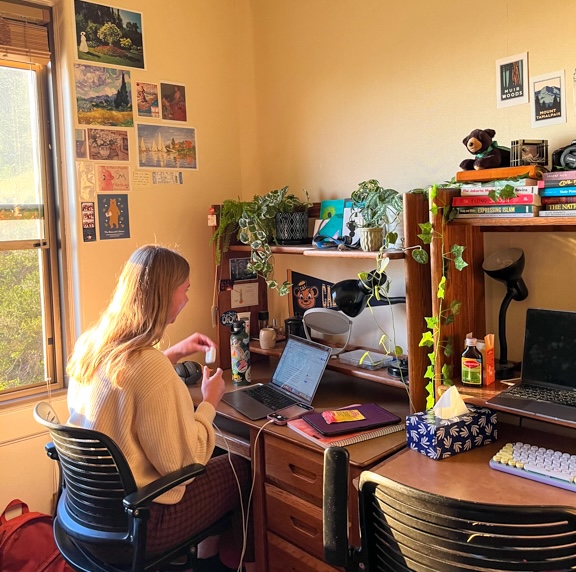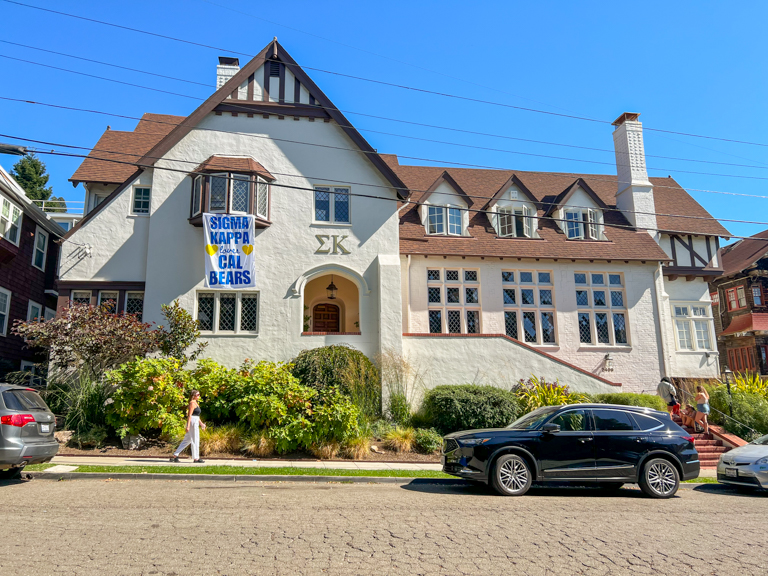
There are other housing possibilities
Are typical routes of renting housing, such as search websites and online listings, not working out? There are other off-campus housing options to look into. Here are some alternatives to consider.
Berkeley Student Cooperative
The Berkeley Student Cooperative, commonly referred to as the Co-ops, is a low-cost, collaborative living community. Each resident is required to contribute five work shift hours per week, including but not limited to washing dishes, cleaning the kitchen, and cooking, amongst other household duties. Read more about membership eligibility. A few members of the Lothlorian and Casa Zimbabwe houses answer some questions about the co-op experience.
How demanding is the time commitment of having a work shift?
Eva Winter, Class of 2024, Public Policy: “For Lothlorien, the work shift commitment is 5 hours, which is honestly less than you would end up working if you are living by yourself or in a different living situation that isn’t a dorm or sorority where there is maintenance staff. I honestly think you would spend more than 5 hours washing your dishes throughout the week if you cook at home. And you have the value of getting to pick your chores—for example, I prefer to wash dishes over cleaning the bathroom, and because I live in a co-op I get to choose to do one and not another. It also comes with the benefits of people on work shift cooking a dinner for you every night and the most food access I have ever had.”
Safia Iyer, Geography, study abroad student from the University of Edinburgh: “For Casa Zimbabwe, you commit to 5 hours of weekly work shift, alongside 2.5 hours of a weekend work shift (which is working at parties doing consent talks, security, sober monitor, etc) and 5 hours of HI (home improvement, where you can paint murals / contribute to improving the environment) per semester.
“I was a bit concerned coming in about how I would manage my work shift alongside my studies and other commitments, but it has been completely doable. My weekly work shift is cookshift (3.5 hours) and making granola for the house (1.5 hours). Cookshift is super sociable and I enjoy it as a way to unwind and chat to friends whilst getting in my hours. On the other hand, I can make granola alone and just put my headphones on and power through. Considering the cheap rent and amazing community you get at the co-ops, I think that the little time asked of you for work shift is really reasonable!”

Interior of Casa Zimbabwe. Photo by Safia Iyer.
How can increased work shifts impact rental costs?
Safia: “If you do more hours than required you can ask for a rent comp/paid work shift, though it has to be agreed on beforehand. A lot of my friends work at CFS (Central Food Service) weekly and get money off of their rent. It is an easy way to make living even cheaper.”
What is the room assignment process like?
Eva: “For Loth we chose rooms based on seniority points in the house.”
Safia: “At Casa Zimbabwe, rooms are assigned based on points. When you first move in you are placed in a temporary room for a week where you can get to know your fellow housemates and potential roommates. Then, a housing bid takes place where you bid for rooms in order of points. You gain BSC points the longer you live in the coops. You can either be randomly allocated a roommate or choose who you want to room with and bid together, combining your points. Once you have your room you can choose to squat for the next semester which means you don’t have to bid again or enter the room bids if you want a different room.”

Casa Zimbabwe house. Photo by Berkeley Co-op website.
What has your experience been like living in this space? Is there anything that surprised you that you didn’t anticipate?
Eva: “So far, it has been more friendly than most group living situations I have been in. Everyone who is living there seems to be living intentionally to build a space for those who are low income, people of color, or disabled, and is very intentional about how much space they take up.”
Safia: “Honestly, I have had an amazing experience at CZ. The community spirit is beautiful and truly unique. If you’re looking for an alternative space that is safe for POC, LGBT+, and low-income students then the co-ops are ideal. Whilst sometimes it can be overwhelming, with CZ often being known for its chaotic energy, once you settle in it’s hard to picture yourself anywhere else.”
International House
You don’t have to be an international student to live at I-House. International House, commonly referred to as I-House, hosts around seventy-five percent of international students and the other twenty-five percent are from the US. If you’re a US resident interested in living amongst an international community, this may be a great opportunity to do so. To qualify, you must be a registered Berkeley student, an undergrad who has completed at least 60 UC credits in junior/senior class standing, a registered graduate or postdoctoral student, a visiting scholar or researcher, an Education Abroad Reciprocity student, or an international student through University Extension. For more frequently asked questions about the application, consult the I-house website.
What has your experience been like living in I-House?
Sarah Jury, Class of 2024, Political Science: “I have really enjoyed living in I-House and have met some of my closest friends at Berkeley here. Especially as an American, it’s been an opportunity to broaden my perspective and gain a better understanding of different cultures and countries. There’s also a lot of conveniences built into the space like study lounges and our dining hall which lets me focus on my classes and other school obligations. Considering the struggles with finding housing in Berkeley, I’m really grateful to be living in I-House and have done so since sophomore year.”
What are a few downsides and upsides to living there?
Sarah: “The upside is that it’s a great community and people are generally very friendly. You get to meet people from around the world and although most are only staying for a semester/year, you get really close just by living together. There are a ton of opportunities to get involved in the house and there’s so many cool events like weekly coffee hours every wednesday to celebrate different countries and twice-semesterly Sunday Suppers (fancy dinners) that are free for residents. It has its own library and other study spaces which are really nice, especially around finals when the campus is so crowded. For dining hall standards, the food is pretty good.
“As for the downsides, I-House is privately run and the board doesn’t often consult residents so it sometimes feels like students don’t have much of a say in being able to make changes. The dining hall has limited hours and since it’s the only place your meal plan works. I usually have to structure my schedule around it. The rooms are pretty small (especially regular doubles) and it is expensive, which is somewhat justified considering location, meal plan, events they host for residents, etc.”

Inside of I-House Dorm. Photo by Sarah Jury.
Greek Housing
A huge motivator for me to join Greek life was the possibility of securing housing. Oftentimes the properties are rent-controlled since the chapters own them and there are scholarships available through the Panhellenic or Interfraternity Councils. There’s typically a live-in requirement for all chapter members for at least one year, with exceptions such as leave of absence or study abroad. Living in Greek housing usually provides meal plans with personal chefs, housekeepers, maintenance workers, and a house manager. For more frequently asked questions about housing, find answers from the Cal Greeks FAQs. To map out where each chapter is, check out their housing addresses.

Sigma Kappa house. Photo by Preslee Vanlandingham.
Students should only look into chapters recognized by the university as they are the only ones overseen by university staff. The Fraternity & Sorority Life office coordinates with the Center for Student Conduct to handle any instances of misconduct within recognized chapters. The most recent report from Fraternity & Sorority Life provides the current status of conduct matters in the Greek community. Recognized chapters follow university guidelines and safety and wellness standards while unrecognized groups do not follow these regulations or policies. As a result, students could be put at risk at their hosted social events. Consult the list of recognized and unrecognized chapters. More information can be found on the student leadership website or by contacting fandslife@berkeley.edu.

Alpha Delta Pi house. Photo by Preslee Vanlandingham.
Look into these alternative possibilities
If the usual routes of searching for housing aren’t being fruitful, check out these other possibilities. Whether you’re considering a co-op, Greek housing, or international dorms, you have other paths to securing housing at your disposal. No matter where you decide, always be a good neighbor. Keep an open mind, and happy exploring your next potential home!
Preslee Vanlandingham is a fourth-year at UC Berkeley majoring in English and minoring in Creative Writing. Feature image is a photo of International House taken at golden hour.
Want More?
- Consider more off-campus housing search tips
- Learn about what to expect when finding housing
- Check out how to travel around Berkeley no matter where you live